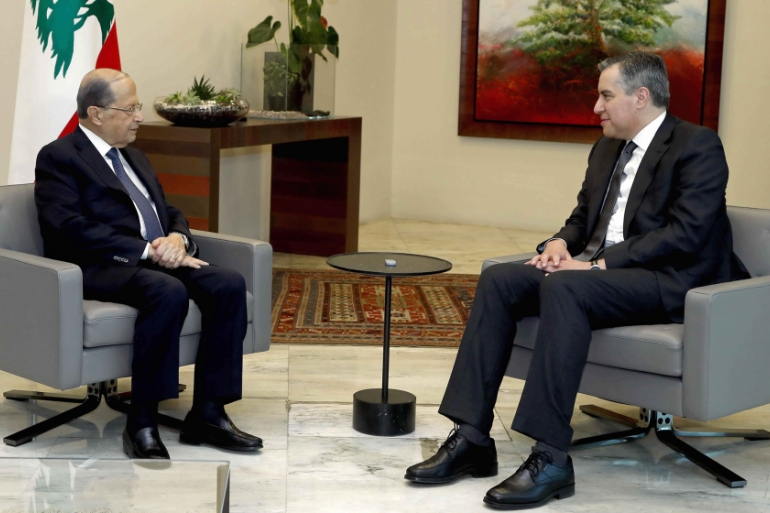
- ARAB NEWS
- 02 Jul 2025

In a press briefing on Monday, ailing Lebanese President Michel Aoun, who had problems reading a scripted speech properly, answered a journalist who asked where the country was heading to if a new government was not formed. He answered with a cold tone: “We are heading to hell.”
The gimmick of the formation of a new government will not save Lebanon, as French President Emmanuel Macron is promoting. The problems and the solutions do not end with Prime Minister-designate Mustapha Adib or his predecessor Hassan Diab and their Cabinets, as both men are a cover-up for a corrupt power structure that uses every maneuver possible to stay afloat.
The first maneuver is the apparent rift between the Free Patriotic Movement (FPM) and Hezbollah. The president’s party said it refuses Hezbollah’s claim to the finance portfolio in the next government, stating that the different ministries are not dedicated to a particular confession. However, this show of integrity will not fool a sharp observer. The accord that laid the foundation of the Hezbollah-Aoun alliance will not be broken anytime soon. The FPM is a client of Hezbollah and it is impossible for Aoun to maintain his entourage and his base of supporters without the financial support of the Iran-sponsored group.
Nevertheless, as the ghost of potential sanctions comes to haunt Gebran Bassil, Aoun’s son-in-law, the apple of his eye and the head of his political party, some distancing — at least publicly — and a controlled feud are deemed necessary. This will allow for the formation of a government: A government in which Aoun will have his share and that will have the blessing of Macron, who is supposed to offer legitimacy for this botched project among the international community.
Although Macron knows that none of the parties are really sincere about relinquishing power to allow for the formation of a real government of technocrats that will implement reforms, he still wants to score a win. If he admits defeat in his Lebanon initiative, he will lose clout on the international scene, as well at home. Macron cannot afford a loss of political capital, especially since he is counting on playing a more prominent role in the region as he seeks to lead European politics in the Middle East.
The Hezbollah-Amal Movement alliance has insisted on keeping the Ministry of Finance, hence positioning itself as the agent and legal guardian of the Shiite community. This meant another maneuver was needed. Former Prime Minister Saad Hariri presented an initiative that chimed with the Amal-Hezbollah demands, as he suggested that the finance portfolio be handed to a Shiite minister who would be named by the acting prime minister, rather than the Shiite alliance. They at first refused the initiative, only to later give positive signs and encourage France to push back the latest deadline for government formation that was supposed to expire on Wednesday evening.
One reason why Hezbollah and Amal want a minister of their own is to keep quiet some of their deals with the government. Though Hezbollah has funding from Iran, it has its own companies that are contracted by the Lebanese government. The last round of US sanctions targeted Hezbollah-linked companies. It will not want a finance minister that it cannot control and might uncover the dubious dealings that have been going on for years.
While waiting for the November presidential election, American policy is marked by indifference and a hands-off approach. It is limited to imposing sanctions on Hezbollah and its acolytes while taking a step back to watch the system that harbors the group crumble. So, with this American retrenchment and with the French president looking for a win rather than substance, a true solution is very unlikely. The next three months are leading Lebanon to hell regardless of whether or not a new government is formed. Economists are expecting that, with the depletion of the foreign reserves, the Lebanese pound’s exchange rate with the US dollar will skyrocket, subsidies on essential goods will be lifted and the country will hit rock bottom.
To add to that, the country is witnessing occasional explosions, like the one seen at a weapons depot in Ain Qana this week. Analysts are saying the explosion seemed to carry the imprints of Israel. The problem is that, if Israel is planning to target all the arms warehouses in the country, it will greatly complicate the difficulties Lebanon is currently experiencing.
Nobody is really ready to bail out Lebanon unless it conducts reforms, but the current structure prevents that from happening.
Dr. Dania Koleilat Khatib
While Aoun on Wednesday gave a speech to the UN General Assembly and thanked the different heads of states that gave donations following last month’s tragic Beirut blast, he does not realize that Lebanon is not at the center of any regional player’s policy and leaving it to fail will not make any leader lose sleep, except for Macron perhaps. Nobody is really ready to bail out Lebanon unless it conducts reforms, but the current structure creates an inertia preventing that from happening. France might intervene with some aid for the upcoming weak government; however, this will only prolong the suffering of the Lebanese by slowing the meltdown process, rather than reversing it.
Unless there is a radical change, the country is indeed on its way to hell, as it was so bluntly put by Aoun, even if Adib does form a government.
Dr. Dania Koleilat Khatib is a specialist in US-Arab relations with a focus on lobbying. She is the co-founder of the Research Center for Cooperation and Peace Building (RCCP), a Lebanese NGO focused on Track II. She is also an affiliated scholar with the Issam Fares Institute for Public Policy and International Affairs at the American University of Beirut.